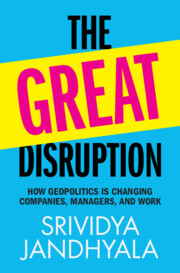Book contents
- Reviews
- The Great Disruption
- The Great Disruption
- Copyright page
- Dedication
- Contents
- Figures
- Tables
- Acknowledgments
- 1 Changing Global Order
- 2 Corporate Nationality
- 3 Geopolitics and Innovation
- 4 Corporate Strategies for Managing Geopolitics
- 5 Managing Geopolitics
- 6 Geopolitics and the Future of Work
- 7 Computational Geopolitics
- 8 Geopolitics and E-Commerce
- 9 Geopolitics and Green Energy
- 10 Looking Ahead
- Index
7 - Computational Geopolitics
Published online by Cambridge University Press: 05 June 2025
- Reviews
- The Great Disruption
- The Great Disruption
- Copyright page
- Dedication
- Contents
- Figures
- Tables
- Acknowledgments
- 1 Changing Global Order
- 2 Corporate Nationality
- 3 Geopolitics and Innovation
- 4 Corporate Strategies for Managing Geopolitics
- 5 Managing Geopolitics
- 6 Geopolitics and the Future of Work
- 7 Computational Geopolitics
- 8 Geopolitics and E-Commerce
- 9 Geopolitics and Green Energy
- 10 Looking Ahead
- Index
Summary
This chapter addresses how one could quantify and explore the impact of geopolitics on global businesses. Computational geopolitics is an attempt to integrate quantitative methods and geopolitical analysis to understand and predict trends. The explosive growth of data, improvements in computational power, and access to cloud computing have led to a proliferation of computational methods in analyzing geopolitics and its impact on companies. The chapter explores some tools and techniques used in computational geopolitics, including events-based approaches to measuring geopolitical tensions, textual approaches, and empirical approaches. In addition, it provides examples of ways in which analysts can quantify the impact of geopolitics on trade and foreign direct investment. It also introduces experimental methods to assess the effectiveness of companies’ strategic responses to geopolitical tensions. Large language models (LLMs) can be used for sentiment analysis, spotting trends, scenario building, risk assessment, and strategic recommendations. While they methods offer advances in quantifying the impact of geopolitics on global businesses, analysts should also be cautious about data quality and availability as well as the complexity of the phenomenon and the geopolitics of AI. The chapter concludes by pointing the reader to some widely used data sources for computational geopolitics.
Keywords
Information
- Type
- Chapter
- Information
- The Great DisruptionHow Geopolitics is Changing Companies, Managers, and Work, pp. 169 - 196Publisher: Cambridge University PressPrint publication year: 2025
